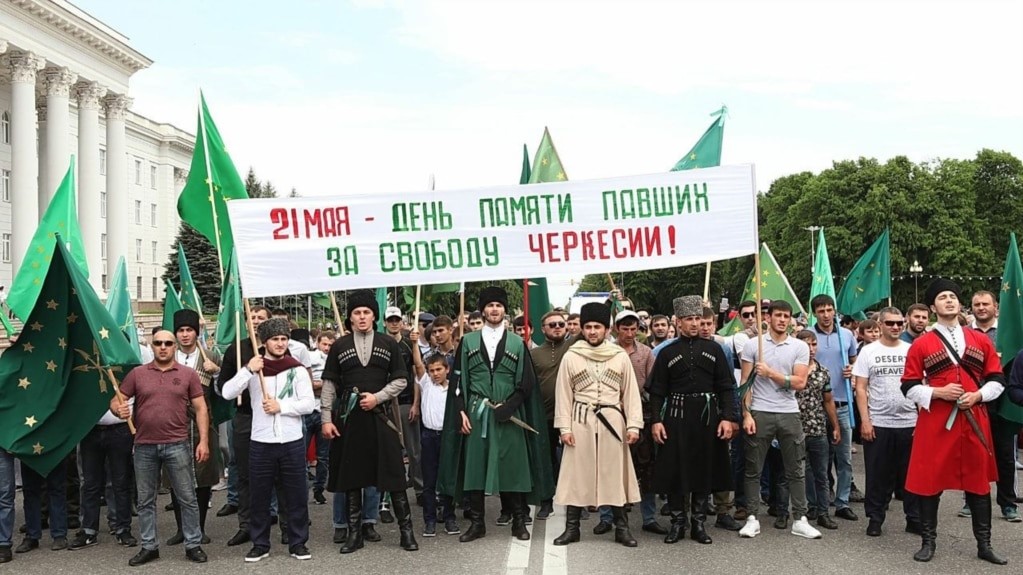Moscow's fears of Circassian independents
Since the end of the 1990s, independence sentiments have been reawakened throughout the Caucasus, and links with the Circassian diaspora spread throughout many countries. With the pandemic, all public demonstrations were suspended, and now in the republic of Kabardino-Balkaria, the Russian authorities no longer allow any expression of local autonomy to resume.
Moscow (AsiaNews) - The activism of Circassian movements at home, in Turkey and in the West is creating considerable concern in the Kremlin, which is already struggling to contain other autonomist movements in the North Caucasus and other regions of the Russian Federation.
The Circassian Turanian tribes, exterminated by the tsars in the nineteenth century, occupied large areas of the current republics of Karachay-Cherkesja, Adygea, Kabardino-Balkaria and the regions of Krasnodar and Stavropol, and then dispersed through emigration, remaining partly a minority in the territories Russians.
Theleader of the Circassian Khabze association, Martin Kočesoko, discussed it in a debate published by Kavkaz.Realii. Martin was born in Kabardino-Balkaria and is co-president of the “Peoples' Democratic Congress of Russia”; a free-lance journalist and collaborator of the dissolved Memorial association, he was sentenced to 3 years in 2021 on a false charge of drug possession and registered in the "foreign agents" register in 2023. After the Russian invasion of Ukraine he managed to leave the country, and now lives in Turkey.
He says he was born in a village where "practically all the inhabitants are Circassian and speak Circassian", and even in primary school the local language was used. In that context "we did not feel oppressed in our national identity, but over time things have changed a lot".
Today in Kočesoko's hometown the use of the Russian language is mandatory at all levels, starting from kindergarten, a maximum of two hours of Circassian language and literature are allowed in schools, and "this situation is creating strong reactions throughout the Caucasus northern".
In 2005 Martin enrolled in the history faculty of Nal'chik University, to deepen his knowledge of the problems of the Circassians: "in my course there were 60 students, 50 were Circassians and not even one of them knew what the Circassian flag”.
Today the green flag with the three swords and 12 stars is known throughout the world, thanks to the activities of the autonomist movements. May 21st is the date of memory of the genocide of the Circassians carried out by the Russians, and always well-attended demonstrations are held in the center of Nal'chik.
Since the end of the 1990s, independence sentiments have reawakened throughout the Caucasus, and the link with the Circassian diaspora spread across many countries has been rediscovered.
The 2014 Sochi Winter Olympics, which were held in the historic Circassian areas conquered by the Russians one hundred and fifty years earlier, was a moment of great awakening.
Circassian Flag Day is now also celebrated on April 25, with meetings organized in 50 states around the world. With the pandemic, all public demonstrations were suspended, and now the Russian authorities no longer allow such expressions of local autonomy to resume.
The president of Kabardino-Balkaria is now simply called “head of the republic” and is not even elected, but appointed directly by the Kremlin. In 2020, local activist associations decided to write an appeal to the authorities in the Circassian language, which caused several problems for many officials who were unable to translate it.
Today, local scholars of Circassian culture are increasingly marginalized, provoking very annoyed reactions in state bodies, even if there have never been dangers of riots or street disturbances, as in Dagestan, Baškortostan or other regions.
One of the most eminent Circassian scholars, the physicist Murat Khokonov, was fired from the university a few months ago for having made a trip to Turkey, where he met his compatriots from the diaspora, who have opened over 250 different associations in that country, organized in three federations together with other exponents of Caucasian ethnic groups.
The largest is Kaffed, which brings together 56 different organizations, and also imagines a "great return" of the Circassians to their original lands, throwing panic into all the offices and halls of power in Russia.
TAGs
19/09/2019 15:28







.png)










